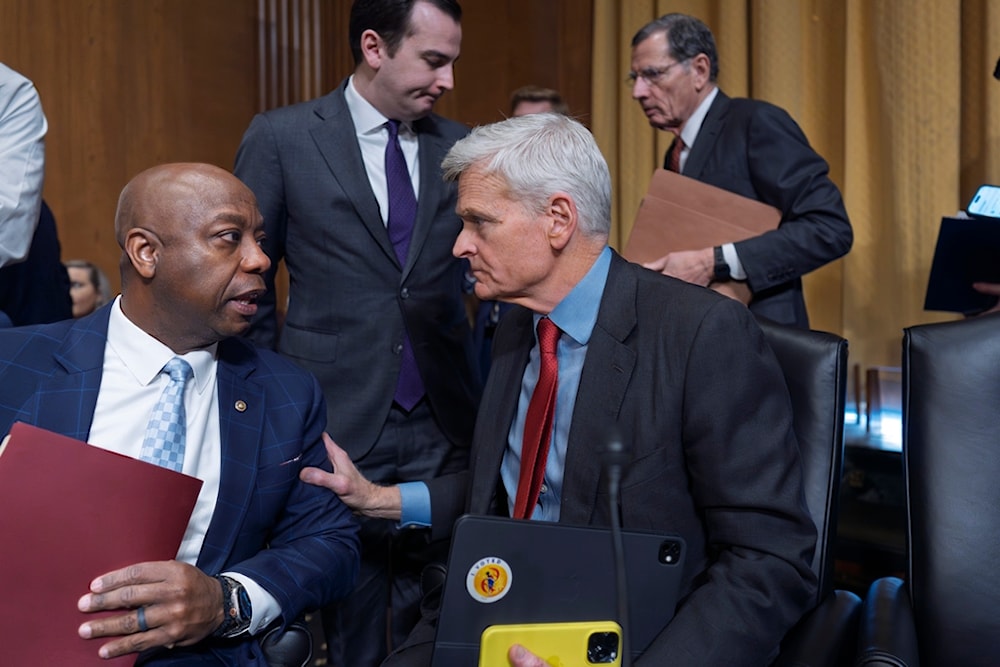RFK Jr. advances in contentious Senate vote for Health Secretary post
Many Republicans remain uneasy about RFK Jr.'s past support for abortion rights, his lawsuits against major corporations, and his 2023 presidential campaign as a Democrat.
-

Sen. Bill Cassidy, R-La., center, speaks with Sen. Tim Scott, R-S.C., left, after the Senate Finance Committee voted to approve the nomination of Robert F. Kennedy Jr. to lead the Health and Human Services Department, on Capitol Hill in Washington, Tuesday, Feb. 4, 2025 (AP Photo/J. Scott Applewhite)
Robert F. Kennedy Jr., a vaccine skeptic and President Donald Trump's nominee for Health Secretary, has advanced past a key Senate vote despite opposition from both parties. The Senate Finance Committee, where Republicans hold a narrow majority, voted 14-13 along party lines on Tuesday to send his nomination to the Senate floor for final confirmation.
His advancement largely hinged on Senator Bill Cassidy, a medical doctor who has been one of Kennedy's strongest critics regarding his claims linking vaccines to autism. Cassidy ultimately backed the nominee after Kennedy assured lawmakers that he would not alter the nation's childhood vaccination program and would maintain existing vaccine recommendations.
His support came after a strong endorsement from Trump, who had previously criticized Kennedy but urged senators to back him. Ahead of the vote, Trump took to Truth Social, writing, "20 years ago, Autism in children was 1 in 10,000. NOW IT'S 1 in 34. WOW! Something's really wrong. We need BOBBY!!!"
Kennedy Controversy
Kennedy's nomination has been met with resistance from both Republicans and Democrats. Many Republicans remain uneasy about his past support for abortion rights, his lawsuits against major corporations, and his 2023 presidential campaign as a Democrat. Democrats, on the other hand, have voiced concerns over his history of spreading vaccine misinformation, allegations of sexual misconduct, and his suggestion that COVID-19 was engineered to spare Jewish people.
Some also point to his claims linking school shootings to antidepressants and accusations that he has profited from lawsuits against pharmaceutical companies, raising concerns about potential conflicts of interest if he were to lead the Department of Health and Human Services. Senator Elizabeth Warren was among those who condemned his nomination, calling Kennedy an "anti-science conspiracy peddler who is willing to gamble with American lives."
The backlash to Kennedy's nomination has not been limited to lawmakers. The New York Post, a conservative-leaning newspaper that generally supports Trump, published an editorial opposing his appointment, arguing that his past statements and actions made him unfit for the role. The paper wrote that there was "too much wackiness" in his record to entrust him with overseeing the nation's healthcare policies.
Read more: Trump's WHO exit threat sparks hiring freeze, budget cuts
Trump's Grip
Kennedy's confirmation battle is the latest sign of Trump's continued hold over the Republican Party. His influence has also been evident in the nomination of Tulsi Gabbard for Director of National Intelligence, another former Democrat who only narrowly passed her committee vote. The Senate Intelligence Committee advanced Gabbard's nomination in a tight 9-8 vote, with key Republicans backing her despite longstanding concerns over her foreign policy positions and past support for pardoning Edward Snowden.
Trump's cabinet picks have been making their way through the confirmation process, with several controversial nominees already securing their posts. Doug Collins has been confirmed as Veterans Affairs Secretary, while Chris Wright, a fracking executive, has been approved to lead the Energy Department. Pam Bondi is expected to be confirmed as Attorney General, replacing Matt Gaetz, who withdrew amid allegations of drug use and sexual misconduct, claims he denies.
Kennedy's confirmation now moves to the full Senate, where his controversial background and the narrow Republican majority will make for a tense and closely watched final vote.

 4 Min Read
4 Min Read








